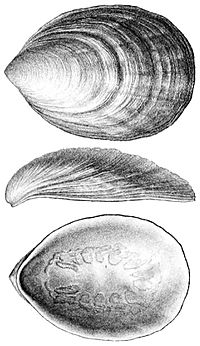Monoplacophora facts for kids
Quick facts for kids Monoplacophora |
|
|---|---|
 |
|
| Pilina unguis | |
| Scientific classification | |
| Kingdom: | |
| Phylum: | |
| Class: |
Monoplacophora
Nils Hjalmar Odhner, 1940
|
Monoplacophora are a special group of molluscs. They are like snails, but their shells are shaped like a cap. These creatures live deep down on the ocean floor.
For a long time, scientists only knew Monoplacophora from fossils. These fossils were found in rocks from the Cambrian Period (about 541 to 485 million years ago) to the Devonian Period (about 419 to 359 million years ago). People thought they had died out millions of years ago.
A Living Fossil Discovery
In 1952, something amazing happened. A special ship was exploring the Pacific Ocean near Mexico. They used a dredge to scoop up things from the deep seabed. To their surprise, they found a living creature that looked just like the ancient Monoplacophora fossils!
This creature was named Neopilina. Finding Neopilina alive was a huge discovery. It was called a "living fossil" because it was a living example of a group thought to be extinct. It's also known as a "Lazarus taxon". This means a group that disappears from the fossil record for a long time, then suddenly reappears.
Extending Their Story
This discovery showed how much we still have to learn about life in the deep sea. It also showed something called the "pull of the recent" in palaeontology. This idea means that for living species, their last known appearance is today. But their last fossil might be much, much older.
Finding Neopilina meant that Monoplacophora had been living on Earth for 400 million years longer than scientists thought! It was a huge jump in their known timeline.
Body Features
Scientists studied Neopilina closely. They found that its body has many parts that repeat. For example, it has several pairs of gills and many repeated muscles. This is called "serial repetition."
This repeating pattern is interesting. It suggests that the very first ancestors of molluscs might have had similar repeated body parts. It also hints that ancient molluscs had bilateral symmetry. This means their body could be divided into two mirror-image halves. They might have also had segments, like a worm.
See also
In Spanish: Monoplacophora para niños
 | John T. Biggers |
 | Thomas Blackshear |
 | Mark Bradford |
 | Beverly Buchanan |

